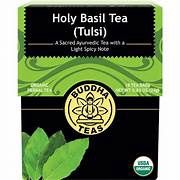HOLY BASIL TEA
Holy Basil, also known as Tulsi, is possibly one of the most beneficial herbs available for human consumption.
- Mythologized in Hindu culture
- Known as an adaptogen
- Source of Antioxidants
- Bleach-Free Tea Bags
- No Preservatives
- No Artificial or Natural Flavors
- No Artificial Sweeteners
- Natural Ingredients
In the Know
Touted as miraculous, and known to have been worshipped in India for thousands of years, Holy Basil, also known as Tulsi, is likely one of the most beneficial herbs available for human consumption. Ayurvedic medicine enlists holy basil for a plethora of health and spiritual concerns, from colds and flu, to fortifying one's powers to protect and purify. How much is myth and how much is truth becomes irrelevant once you experience the sublime results of drinking a cup of Buddha Teas Holy Basil Tea.
What Exactly is Holy Basil?
In Hinduism, the Tulsi plant, or Holy Basil, is deemed the most sacred of plants, and is thought of as the physical manifestation of the goddess, Tulsi. In traditional Hindu homes, Tulsi is centrally planted inside courtyards. As Tulsi is considered to both spiritually protect and physically heal, one can easily understand the significance given to this remarkable herb.
Interesting Notes About Holy Basil
Holy Basil is considered an adaptogen: "any of various natural substances used in herbal medicine to normalize and regulate the systems of the body." (Dictionary.com) Adaptogens are a special category of healing plants; they are meant to help balance and restore the body. Though there are various popular adaptogens utilized in the growing field of alternative medicine, holy basil is a super power, and often deployed by Ayruvedic practitioners to combat the damage accrued by living with the everyday stresses of life.
What Does Buddha Teas Holy Basil Tea Taste Like?
If you imagine your Buddha Teas Holy Basil Tea is going to taste like a cup of pesto, you would be wrong. Far from the savory Italian yumminess of a pasta sauce, our Holy Basil Tea spreads across your mouth like a slightly sweet, somewhat spicy surprise. Hints of clove, and a windswept pirouette through earthiness, we find the taste grounding, yet elevating. A truly well-rounded tea experience, we think you'll agree one sip of Buddha Teas Holy Basil Tea will elevate the moment, and leave you wanting more.

